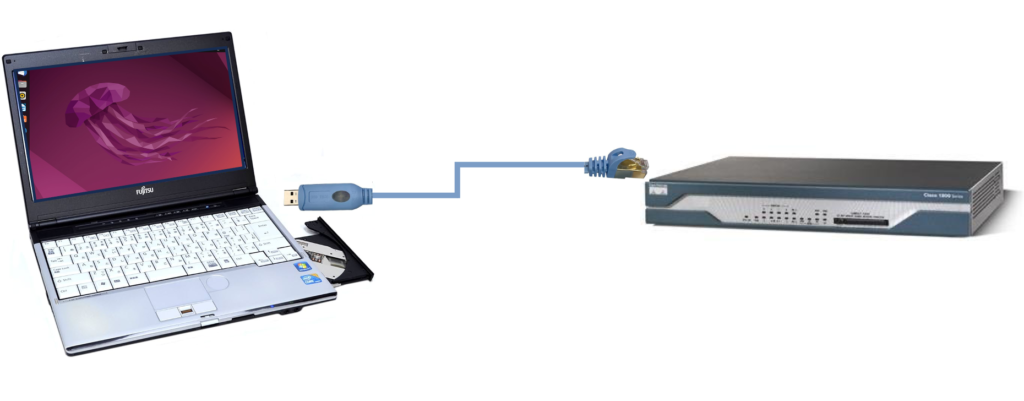ルータまたはコンピュータを Cisco 1812J に接続する前に、Cisco 1812J を設定する必要があります。
また、以前に使用したことがある場合は、以前の設定が残っている可能性があります。
この記事では、Cisco 1812J を初期化し、使用できるように設定します。
その他、入れておくと便利な設定も紹介します。
機器
- Ubuntu 22.04 (富士通 LIFEBOOK S560/B)
- Cisco 1812J
- USB RJ45 コンソールケーブル
構成

事前準備
この記事は、以下を実施済みであることを前提としています。
- 「Ubuntu 22.04 から Cisco 1812J へシリアル接続」を実行済みとします。
- つまり、Cisco 1812J コンソールに接続し操作が可能な状態とします。
手順
設定を初期化するには、設定を削除してリロードします。
Router1> enable
Password: <Enter the password>
Router1# erase startup-config
Erasing the nvram filesystem will remove all configuration files! Continue? [confirm] <Press ENTER key>
[OK]
Erase of nvram: complete
*Apr 1 13:09:39.943: %SYS-7-NV_BLOCK_INIT: Initialized the geometry of nvram
Router1# reload
Proceed with reload? [confirm] <Press ENTER key>
*Apr 12 13:56:57.875: %SYS-5-RELOAD: Reload requested by console. Reload Reason: Reload Command.その後、初期設定を行っていきます。
--- System Configuration Dialog ---
Would you like to enter the initial configuration dialog? [yes/no]: yes
At any point you may enter a question mark '?' for help.
Use ctrl-c to abort configuration dialog at any prompt.
Default settings are in square brackets '[]'.
Basic management setup configures only enough connectivity
for management of the system, extended setup will ask you
to configure each interface on the system
Would you like to enter basic management setup? [yes/no]: yes
Configuring global parameters:
Enter host name [Router]: Router1 <- ルーターの名前を設定
The enable secret is a password used to protect access to
privileged EXEC and configuration modes. This password, after
entered, becomes encrypted in the configuration.
Enter enable secret: ******** <- 暗号化パスワードを設定
The enable password is used when you do not specify an
enable secret password, with some older software versions, and
some boot images.
Enter enable password: ******** <- 特権モード(enable)のパスワードを指定
% Please choose a password that is different from the enable secret
Enter enable password: ******** <- 特権モード(enable)のパスワードを指定
The virtual terminal password is used to protect
access to the router over a network interface.
Enter virtual terminal password: ******** <- telnetのログインパスワードを指定
Configure SNMP Network Management? [yes]: <Press ENTER key>
Community string [public]: <Press ENTER key>
Current interface summary
Any interface listed with OK? value "NO" does not have a valid configuration
Interface IP-Address OK? Method Status Protocol
BRI0 unassigned NO unset down down
BRI0:1 unassigned YES unset down down
BRI0:2 unassigned YES unset down down
FastEthernet0 192.168.1.10 YES DHCP up up
FastEthernet1 unassigned NO unset up down
FastEthernet2 unassigned YES unset initializing down
FastEthernet3 unassigned YES unset initializing down
FastEthernet4 unassigned YES unset initializing down
FastEthernet5 unassigned YES unset initializing down
FastEthernet6 unassigned YES unset initializing down
FastEthernet7 unassigned YES unset initializing down
FastEthernet8 unassigned YES unset initializing down
FastEthernet9 unassigned YES unset initializing down
Vlan1 unassigned YES unset up down
Enter interface name used to connect to the
management network from the above interface summary: FastEthernet1 <- 設定するインターフェイスを指定
Configuring interface FastEthernet1:
Use the 100 Base-TX (RJ-45) connector? [yes]: <Press ENTER key>
Operate in full-duplex mode? [no]: <Press ENTER key>
Configure IP on this interface? [yes]: <Press ENTER key>
IP address for this interface: 192.168.101.1 <- インターフェイスの IP アドレスを指定
Subnet mask for this interface [255.255.255.0] : <Press ENTER key>
Class C network is 192.168.101.0, 24 subnet bits; mask is /24
The following configuration command script was created:
hostname Router1
enable secret 5 $1$F3nC$LiNukzm2zG5JG1GGhg7mE.
enable password ********
line vty 0 4
password ********
snmp-server community public
!
no ip routing
!
interface FastEthernet0
shutdown
no ip address
!
interface FastEthernet1
no shutdown
media-type 100BaseX
half-duplex
ip address 192.168.101.1 255.255.255.0
!
interface FastEthernet2
shutdown
no ip address
!
interface FastEthernet3
shutdown
no ip address
!
interface FastEthernet4
shutdown
no ip address
!
interface FastEthernet5
shutdown
no ip address
!
interface FastEthernet6
shutdown
no ip address
!
interface FastEthernet7
shutdown
no ip address
!
interface FastEthernet8
shutdown
no ip address
!
interface FastEthernet9
shutdown
no ip address
!
interface Vlan1
shutdown
no ip address
!
end
[0] Go to the IOS command prompt without saving this config.
[1] Return back to the setup without saving this config.
[2] Save this configuration to nvram and exit.
Enter your selection [2]: <Press ENTER key>
The enable password you have chosen is the same as your enable secret.
This is not recommended. Re-enter the enable password.
media-type 100BaseX
^
% Invalid input detected at '^' marker.
Building configuration...
Use the enabled mode 'configure' command to modify this configuration.
Press RETURN to get started!さらに、次の設定を構成することをお勧めします。
Router1> enable
Password: <Enter the password>
Router1# conf t
Enter configuration commands, one per line. End with CNTL/Z.
# 入力ミスを IP アドレスに変換しない
Router1(config)# no ip domain lookup
# 「%Error opening tftp://255.255.255.255」エラーを無効
Router1(config)# no service config
# コンソール設定モードに入る
Router1(config)# line console 0
# ログ出力がコマンドの入力を妨げない
Router1(config-line)# logging synchronous
# 特権モード(enable)のタイムアウトを30分0秒に指定
Router1(config-line)# exec-timeout 30 0
Router1(config-line)# exit
Router1(config)# exit
*Apr 6 12:27:49.547: %SYS-5-CONFIG_I: Configured from console by console

コメント